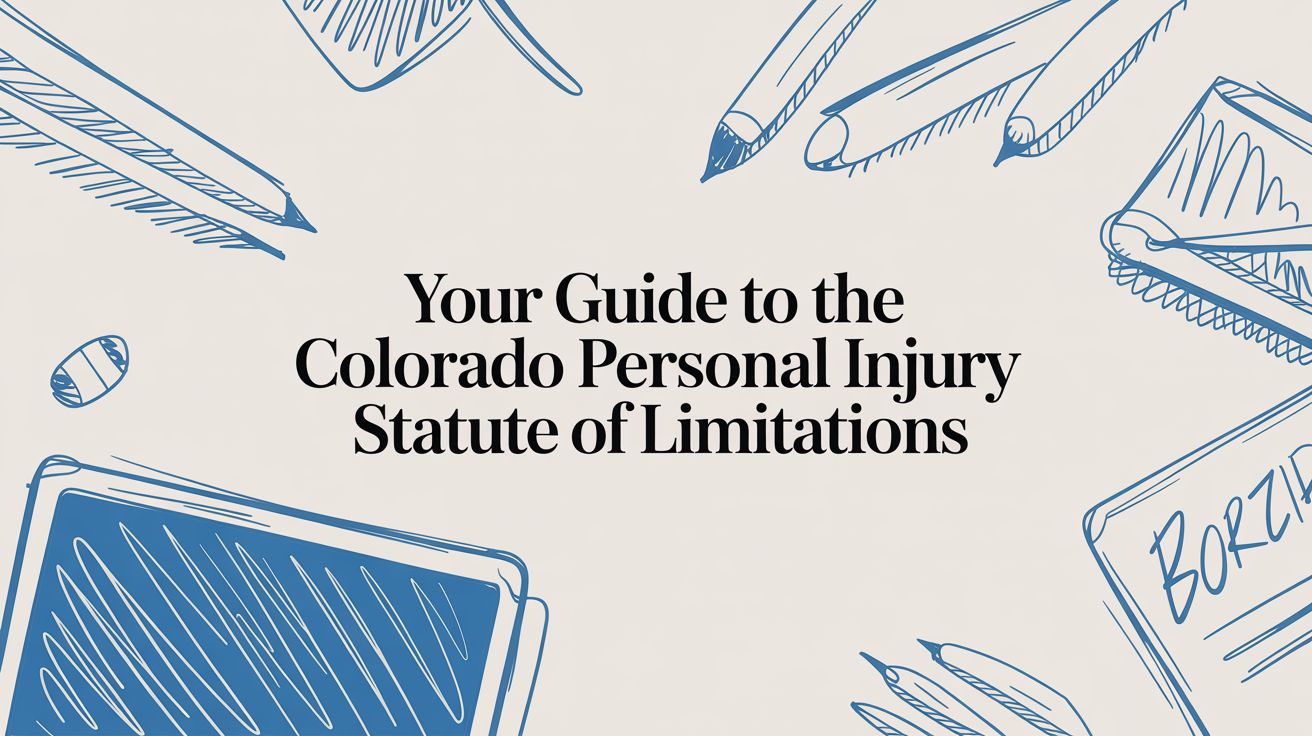Table of Contents
Let’s play a game. You get in a wreck. Not your fault. Some texter in a Tacoma blew a red light on Powers Boulevard. Now your car is crumpled, your shoulder is shredded, and your world—the one you meticulously planned and paid for—has ground to a screeching halt.
A) The at-fault driver’s insurance adjuster calls. He sounds… nice. Shockingly nice. He says they accept full responsibility and just need a recorded statement to “expedite your payment.” You think, “Great, one less thing to worry about.”
B) Medical bills start arriving. The nice adjuster says, “Just send them to us, we’ll handle everything.” A wave of relief washes over you. This might not be so bad after all.
C) Weeks later, you get a lowball offer. It barely covers your ER visit, let alone the surgery you need. You call the nice adjuster. He’s not nice anymore. He says your own doctor’s records show a “pre-existing condition” and that you “delayed treatment.” He uses your recorded statement against you.
This isn’t a game. It’s the playbook. Every single time. Finding the best personal injury attorney Colorado Springs has to offer isn’t about luxury—it’s about survival against a system designed to deny and devalue your pain.
The Trick Insurance Companies Don't Want You to Know
They want you to think this is a negotiation between equals. It isn’t. It’s you, injured and overwhelmed, against a multi-billion-dollar corporation that employs armies of adjusters and lawyers trained in one thing: paying you as little as legally possible. Often, less.
Their entire business model is based on a simple, brutal calculation—the "float." They collect premiums, invest that money, and profit. Every dollar they pay you is a dollar out of their shareholders' pockets. Your recovery is a line-item expense they are incentivized to slash.
The single most powerful tool you have to level this impossibly tilted playing field is a trial-ready attorney. Not a lawyer who just sends letters—an attorney who makes the insurance company believe, deep in its cold corporate heart, that it’s cheaper to pay you fairly than to face them in a courtroom.
That’s the trick. It’s the only trick.
How to Find a Real Advocate, Not Just Another Billboard
The Pikes Peak region is flooded with legal advertising. Everyone promises justice, big checks, and a shoulder to cry on. Most of it is noise. You need a signal. Here’s how to cut through the static and find a lawyer who will actually fight for you.
- Look for a Contingency Fee (But Ask About Costs). You should never pay a dime upfront. The lawyer gets paid a percentage of what they recover for you—if they recover for you. But ask who pays for case costs (expert witnesses, filing fees, depositions) if you lose. The answer tells you everything about how much they believe in their own abilities.
- Verify Their Trial Record. Don’t ask if they go to trial. Ask them to tell you about their last trial. A firm that never sees the inside of a courtroom is a paper tiger. Insurance companies keep meticulous notes on which lawyers settle cheap and which ones will make them bleed. You want the latter.
- Read the 1-Star Reviews. Any successful firm will have some. But look for patterns. Is it always about poor communication? About feeling passed off to a paralegal? A slick website can’t hide a broken process.
- The Consultation is a Two-Way Interview. You aren’t just asking for help; you’re hiring for a critical job. Do they listen? Do they explain their strategy in plain English? Do you feel like a person or a potential paycheck? Trust your gut—it’s usually right.
Insurance companies have one dirty tactic they love above all others: they will use your own words from a recorded statement against you to deny your claim. They count on your politeness, your confusion, and your pain to trap you. Never, ever give a recorded statement without your lawyer present.
Our Shortlist of the Best Personal Injury Attorney Colorado Springs Options
Look—I have a horse in this race. My firm, Conduit Law, represents people in Colorado Springs. But my goal here is to get you help, period. If that’s with us, great. If it’s with another excellent firm, that’s also a win. The only loss is you facing the insurance machine alone.
Here are the firms and resources I’d point my own family to if they needed help in the Springs.
1. Conduit Law | Accident Attorneys
Yes, this is us. We’re based in Denver, but we represent clients across Colorado—including a significant number in El Paso County. We built our firm for one reason: to hit insurance companies so hard they pay our clients what they rightfully deserve. We prepare every case as if it’s going to trial. This relentless preparation is why most of our cases settle for maximum value without ever setting foot in court.
We run on a contingency fee, are available 24/7, and have recovered over $50 million for our clients. We handle the fight so you can focus on healing. Simple as that. You can find more specific information about their services for Colorado Springs residents on our site.
- Website: https://conduit.law
- Pricing: Contingency-fee basis. Free consultation.
- Service Area: All of Colorado, including Colorado Springs.
2. McDivitt Law Firm — Colorado Springs
You’ve seen the name. McDivitt is one of the state’s larger and more established firms for a reason. They have the resources—the investigators, the paralegals, the sheer manpower—to wage war against the biggest insurance carriers.
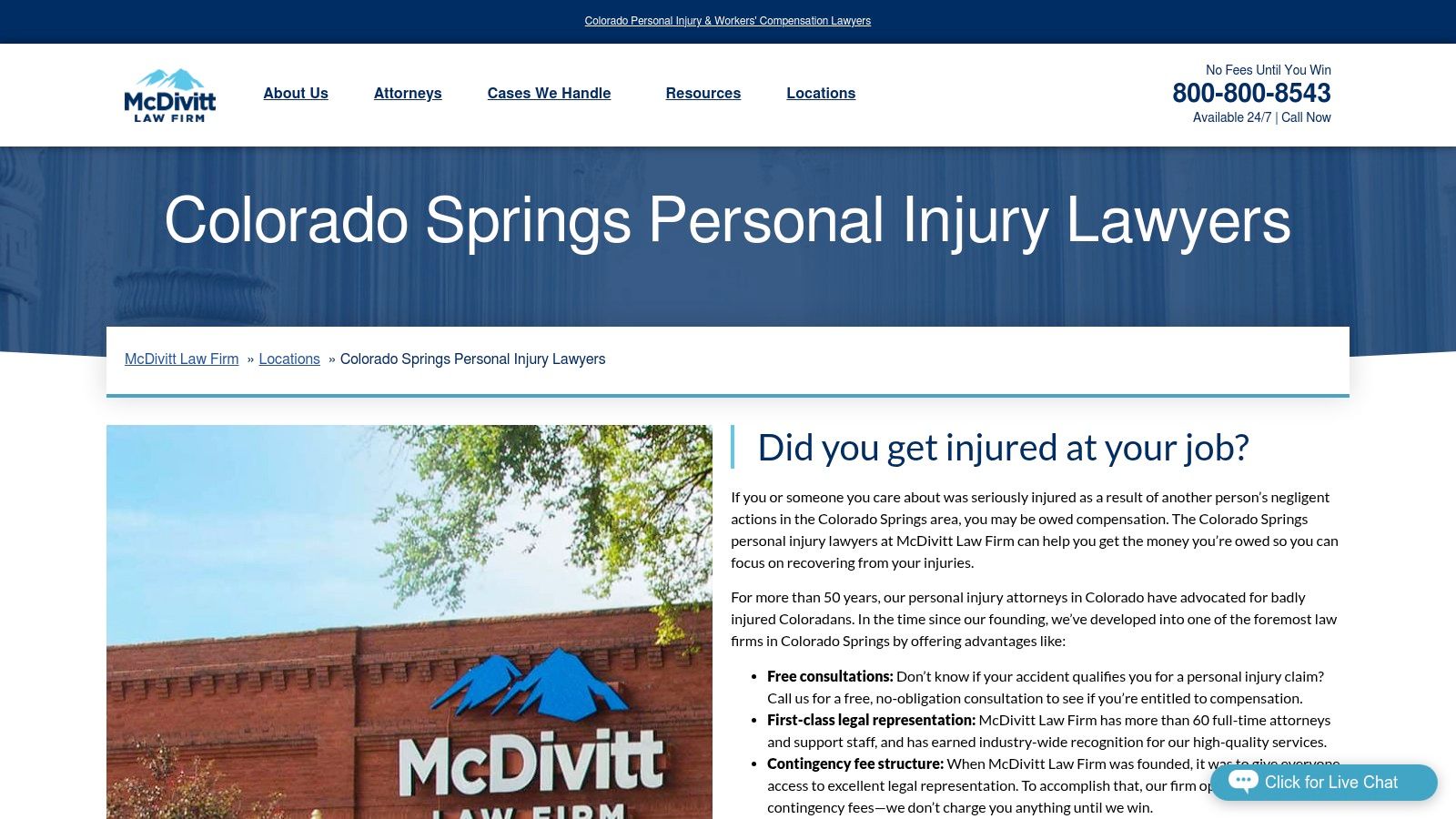
When your case is catastrophic/complex and you know the fight will be a long, expensive slugfest, a firm with McDivitt’s weight class is a powerful ally. They bring institutional strength.
- Website: McDivitt Law Firm - Colorado Springs
3. Heuser & Heuser, LLP — Colorado Springs
Heuser & Heuser feels like a true local champion. As a veteran-owned firm, they bring a level of discipline and community focus that resonates deeply in Colorado Springs.

One of their standout features is helping clients coordinate medical care—a huge, often overwhelming, piece of the post-accident puzzle. They offer a holistic approach to your recovery, not just your legal case.
- Website: Heuser & Heuser, LLP
4. Schofield & Green Law — Colorado Springs
Formerly The Green Law Firm, Schofield & Green provides that critical boutique-firm experience. If you want to know your lawyer—not just their case manager—this is the kind of firm you look for.
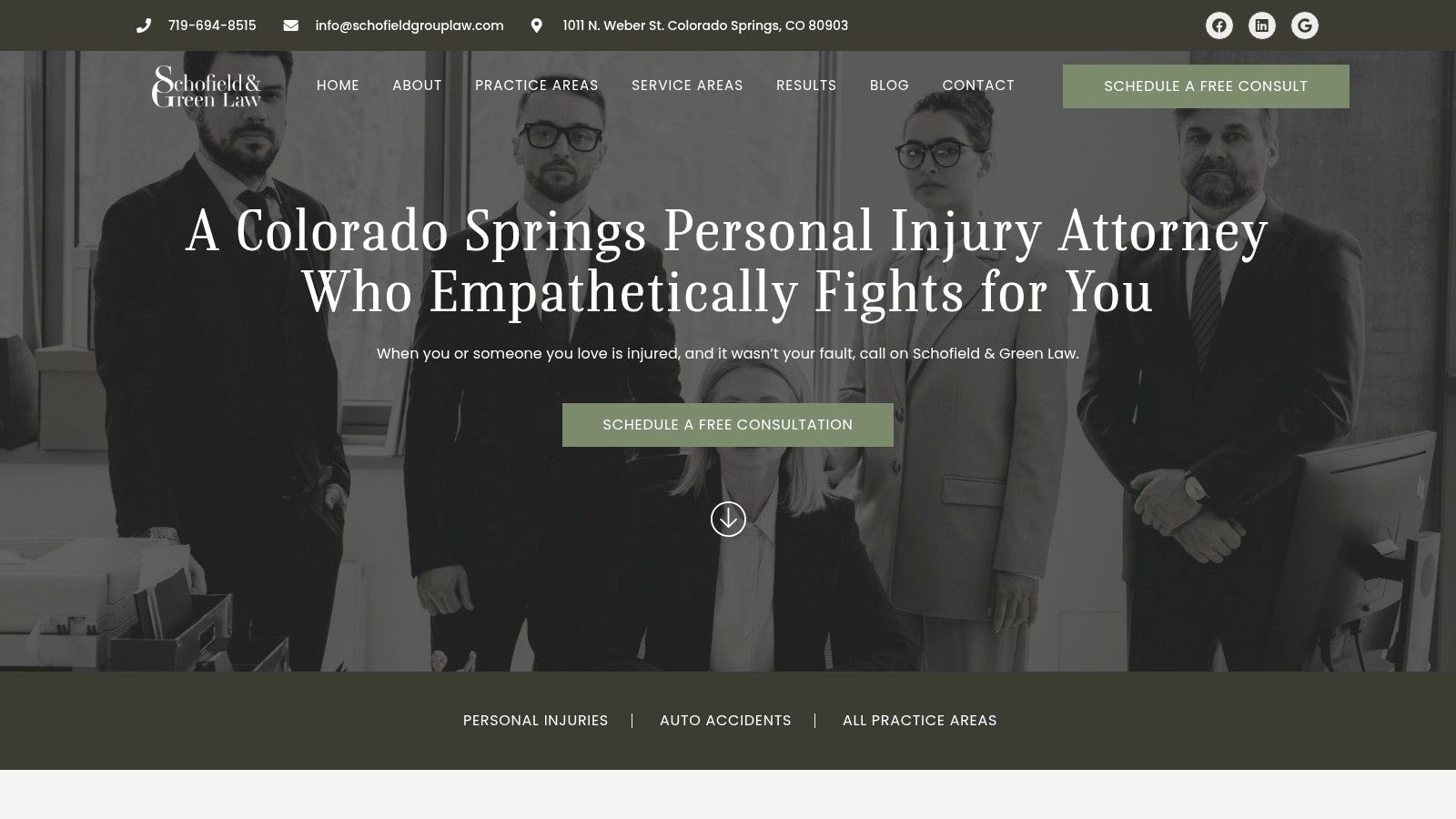
Led by Andrea Schofield, this woman-owned firm provides direct, personalized attention. It's an ideal choice for someone who values a close working relationship with their attorney from start to finish.
- Website: Schofield & Green Law - Colorado Springs
5. Super Lawyers — Colorado Springs Personal Injury Directory
Think of this as a vetted starting point. Super Lawyers isn’t just a list—it’s a rating service that uses a patented, multi-phase selection process. Only the top 5% of attorneys in a state make the cut.
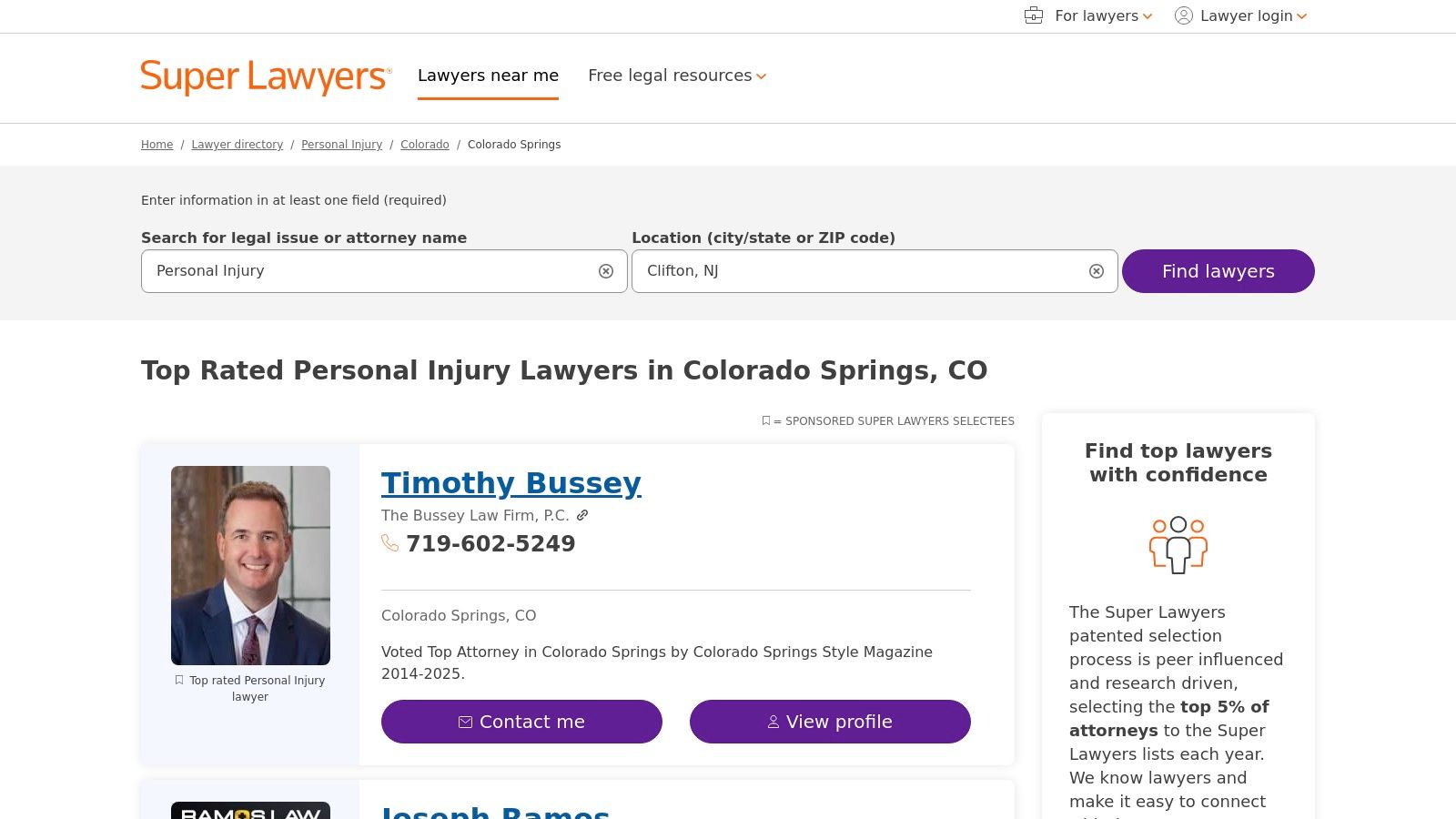
It’s an efficient way to build a shortlist of highly respected professionals who have been recognized by their peers. It cuts out a lot of the marketing fluff.
6. Avvo — Colorado Springs Personal injury Lawyer Listings
Avvo gives you a raw, wide-angle view of the legal market. Its greatest strength is the unfiltered client reviews. You get to see what real people—not marketing departments—have to say about their experience.
Use its powerful filters to sort by practice area, client rating, and free consultations. It’s a fantastic tool for comparing a dozen attorneys side-by-side before you start making calls.
7. Forbes Advisor — “Best Personal Injury Lawyers in Colorado Springs, CO” (2025)
A name like Forbes carries weight. Their Advisor lists are editorially curated, meaning attorneys are selected based on credentials, peer recognition, and results—not because they paid for an ad.
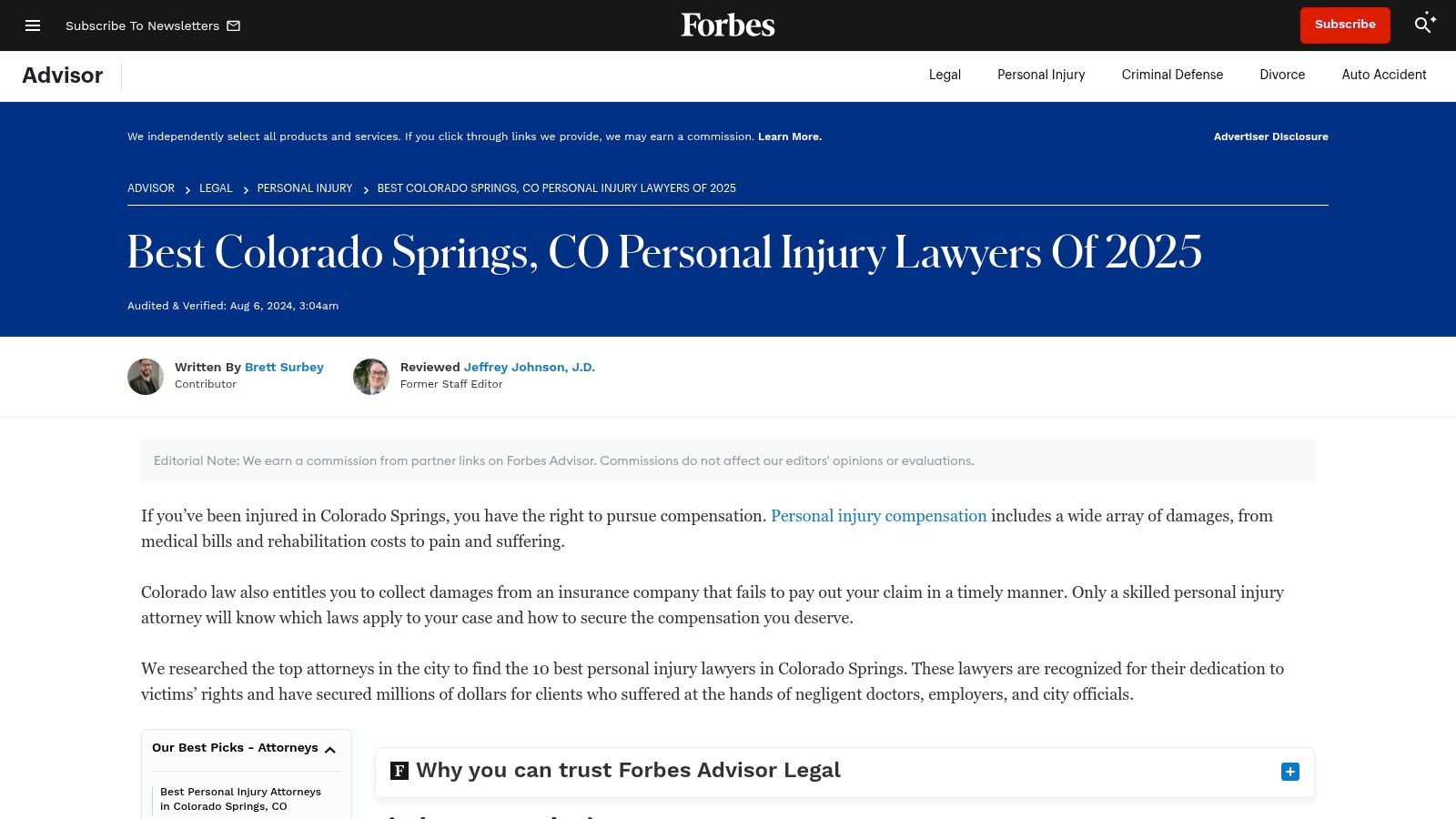
This is a great resource for cross-checking names and getting a third-party, authoritative perspective on who the top practitioners are in the Springs.
The One Thing You Cannot Do Is Nothing
The worst insurance company tactic is the one that works most often—delaying and denying until you give up. They use your recorded statement against you. They lowball you. They drag things out, knowing you’re buried in bills and getting desperate. They are counting on your exhaustion.
Don’t give them the satisfaction.
Choosing an attorney is a deeply personal decision. It’s about trust. After you’ve done the research, you have to pick the person you believe in—the one whose voice on the other end of the phone makes you feel like you can finally take a breath. The one who makes you feel safe.
This isn’t about finding a lawyer with the most billboards; it's about finding your advocate. The right fit. The person who will pick up the phone when you call and say, calmly and confidently, “I got you.”
Go find your champion.
Disclaimer: This article is for informational purposes only and does not constitute legal advice. The information contained herein is not intended to create, and receipt of it does not constitute, an attorney-client relationship. You should not act or refrain from acting based on this information without seeking professional legal counsel.
When you’re ready, my team and I are here. The consultation is always free. Call us. We’ll listen.
Written by
Conduit Law
Personal injury attorney at Conduit Law, dedicated to helping Colorado accident victims get the compensation they deserve.
Learn more about our team


